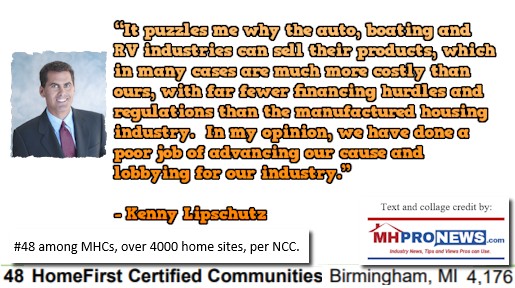
Every part of the headline will be covered in this column and analysis, only the sequence will be mixed. Let’s frame this report simply.
Affordable housing is potentially worth hundreds of billions of dollars a year in the U.S. That’s the conclusion of Jeff Bezos’ Amazon Alexa Fund. Yet, manufactured housing only did about $6.5 billion at retail in 2017 (2018 totals won’t be known for a few weeks). That means there is a huge upside potential.
Which begs the question. Why isn’t that potential being properly tapped?
Manufactured housing has always had high potential, but it has never achieved it. During an affordable housing crisis, that’s an opportunity in disguise. If you happen to be a small to midsized business, manufactured housing advocate, or investor, and wondered why this industry isn’t easier or doing better than it should be, today’s column will shed light on that topic.
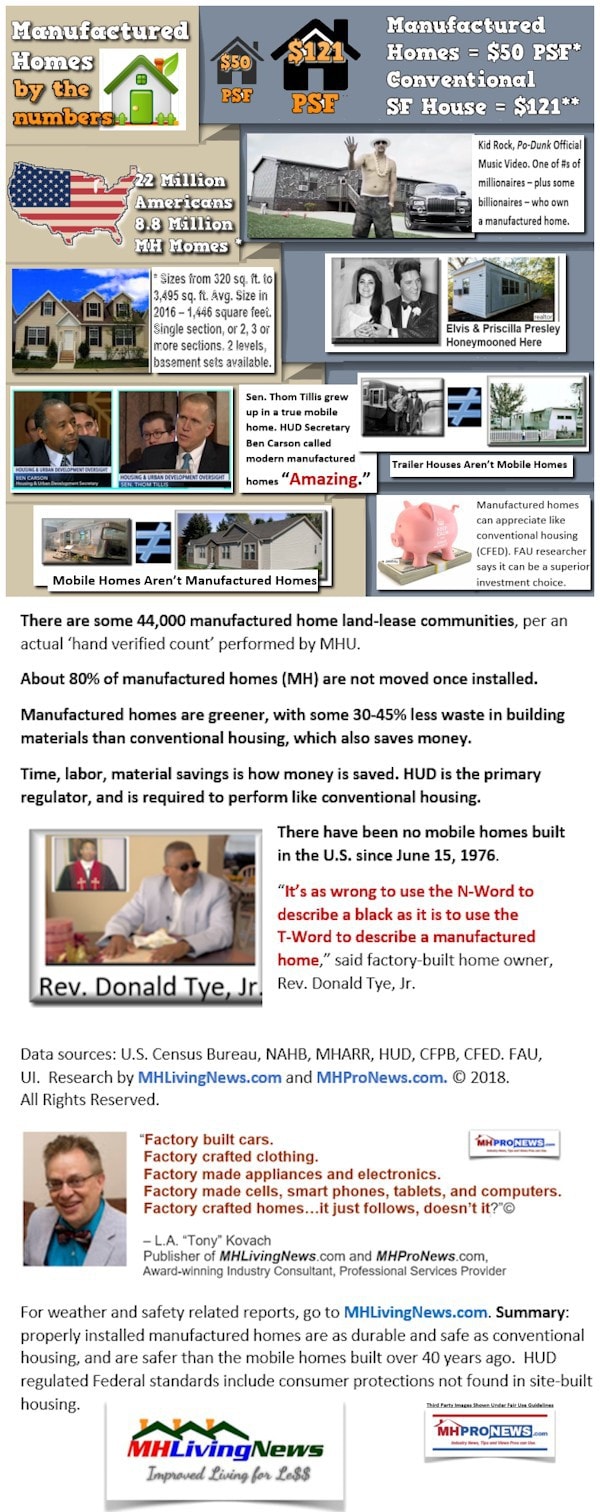
The manufactured housing opportunity demands serious effort and some capital to properly access the market with what the public wants at various price points. That the factory homebuilding market is worth the effort is attested to by Warren Buffett, Sam Zell, Bill Gates, and Jeff Bezos, among scores of others.
The chart below by the National Association of Realtors™ (NAR) speaks volumes.
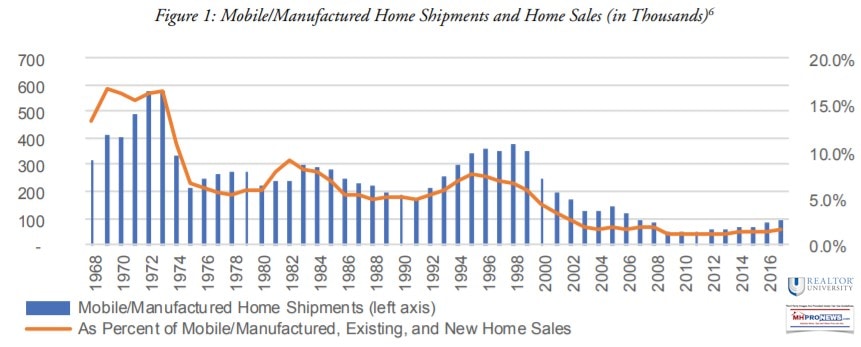
It was part of the NAR 2018 report that made an overall good case, based upon research, facts, and evidence, for manufactured housing. The writer of that NAR report was kind enough to cite this author in her first footnote.
So, if the market potential is so great, why is the manufactured home industry struggling so much? When we have ‘two great laws’ already on the books, why is our industry struggling?
That’s what this column will begin to explore. This matters to you only if affordable housing and manufactured homes are important to you as a professional.

Citing Facts, Evidence, and Sources
We believe in citing sources whenever possible and giving credit where it’s due. Manufactured housing success story Marty Lavin said about a decade ago that the industry, if not careful, could go the way of the buggy whip.
When horse drawn carriages were no longer the primary means of transportation, buggy whip demand dropped like a rock.
Why listen to Lavin?
Lavin has enjoyed notable successes in manufactured home land lease communities, high volume retail, and in performing manufactured home lending.
Lavin happens to be an attorney too. He and his wife reside in a large and elegant home in an appealing part of Burlington, VT in the late spring, summer, and into the fall. When winter strikes up north, they go to Miami Beach, where they live in a custom Italian made vessel that has three levels, is 72’ long, and originally sold for millions of dollars. The Lavins still have numerous financial and real estate interests.

Marty and this writer have spent numerous hours debating and discussing the HUD Code manufactured home industry. As the photos above and below suggest, some of those discussions were in the Lavins’ fine craft, and at his home.
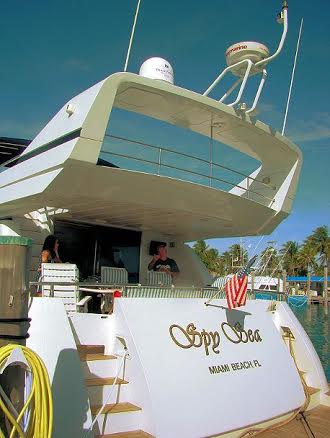
As with any two people, Marty and I see some things similarly, others not. It should be noted that his better half was a keen part of their financing operation.
One of those operations that Lavin had is now part of Credit Human, Federal Credit Union. It used to be called, Mountainside Financial.
For those in MHVille who know Marty, when he speaks, people in the know of our industry listen. MHI gave him a coveted award, a GSE had him for consulting, and so on.
Now you know, some of the rest of that story.
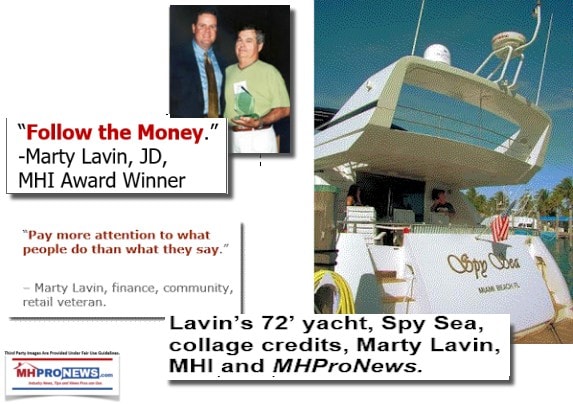
Big Fish, Small Fish, Midsized Fish
A former reality TV star and real estate billionaire once said, if you are going to be thinking anyway, you might as well think big.
But thinking alone – big or otherwise – is never enough. Planning, execution, and other factors enter into the mix of sustainable, ethical business success.
Among the roadblocks of life in modern America are the jealous, and those who will stoop to any trick or dishonest device to trip up another. If you’ve worked in an office or company for any length of time, the words ‘company politics’ has meaning, right?
If one gives credence to an interesting perspective of a New York Times columnist a few weeks ago, the United States of America (USA) was established on more than a principle of distrust in public officials. Independent-minded Americans also distrusted Monopolists. Those bags of tea that went into Boston Harbor in 1775 were the product of a British state-sanctioned monopolist.
New York Times-David Leonhardt-“The Monopolization of America,” Manufactured Housing Slant
It’s a historically valid point.
Much of the Bill of Rights – the first ten amendments to the U.S. Constitution – revolve around the simple notion of protecting individuals against oppression by others. Those others included public officials, but it wasn’t limited to them. Monopolists of various kinds have ever been in the background of America’s history, even if they didn’t embrace that term.
Bear in mind, that there is more than one kind of slavery.
The original purpose of America’s government was to protect life, liberty, and property. Let the people earn a honest living, and let them keep the vast majority of the fruits of their labors. Realize or recall that there was no federal income tax until about a century ago. There was no federal reserve system either. There was also – especially compared to today – almost no federal debt. Today, the debt is soaring towards $22 trillion dollars.
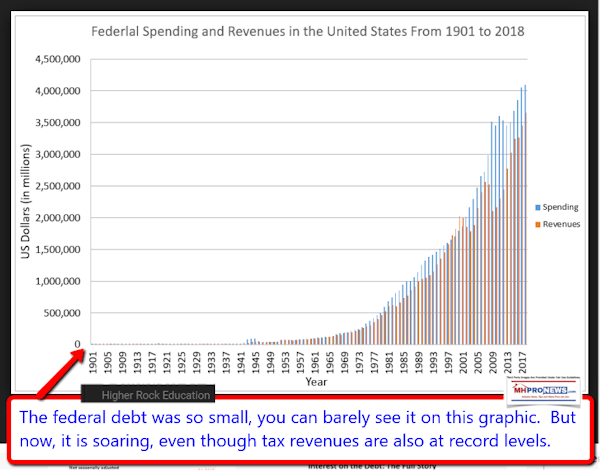
That pre-income tax, pre-Federal Reserve system in America yielded the most successful economy in human history up to that point in time. Tariffs paid for much of the federal government, which was modest in size. We didn’t have endless wars overseas. While property taxes began not too long after the revolution, and well before income taxes, all of those taxes began low.
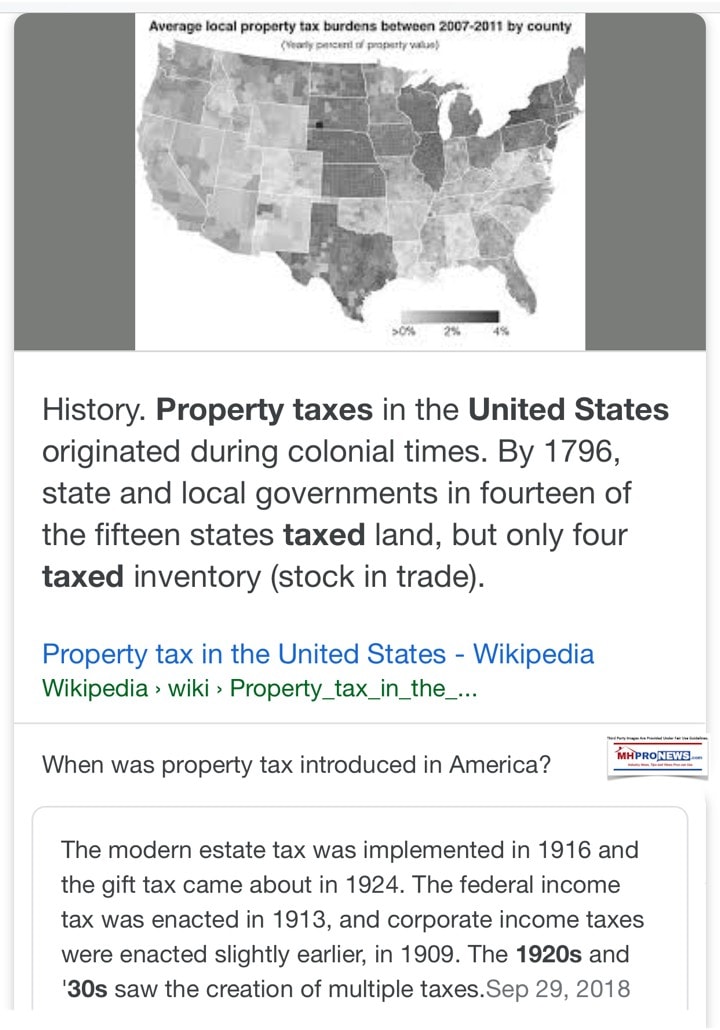
A snapshot of taxes in America are above and below.
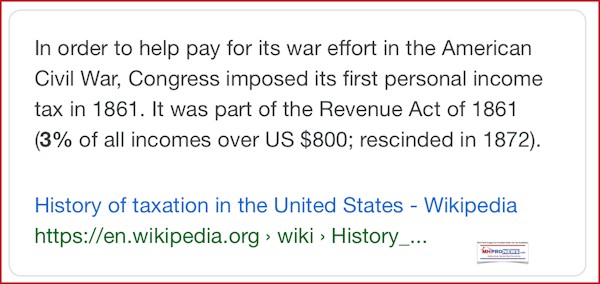
It would be overly simplistic to say that Woodrow Wilson – a racist who happened to be a Democrat – began by himself to change what made America the most successful nation on the planet. It is axiomatic that there are routinely powerful people behind a president, or other politicians.
Over the years, what was true about the U.S. prior to the Wilson administration slowly morphed into what we now have in the U.S.A. today.

Wheat and chaff. We all produce some of both. It’s wise to learn from both the good and the ill caused by ourselves and others. Yes, we ought to learn the bad, because without that, how are mistakes previously made to be avoided?
Warren Buffett is debatably correct when he says that the lesson of history is that most fail to learn from history. But Buffett arguably says that as his way of explaining how he and his investors benefit because they learn from history, while most others don’t. They think they can count on you not reading this far, or not knowing any history.
Let’s rephrase that Buffet tip. Are you and your colleagues learning from history?
Before Donald J. Trump became a TV star – on a show I never watched for more than a few minutes (pardon me, Mr. President, but that’s the truth) – this writer already knew his Art of the Deal book. Before Warren Buffett became a household name, I already had a book of Buffett quotes. Wheat and chaff.
That means, take the good, learn from each person’s good ideas. But whatever remains that is chaff ought to be ignored, burned up, used for mulch, or fed to cattle.
We can all learn from the opposition, not just from allies. There are things Buffett says that are spot on, others, not so much. So on throughout the industry or nation, including moi. We’ve all produced wheat and chaff. But some chaff we don’t grasp until later on.
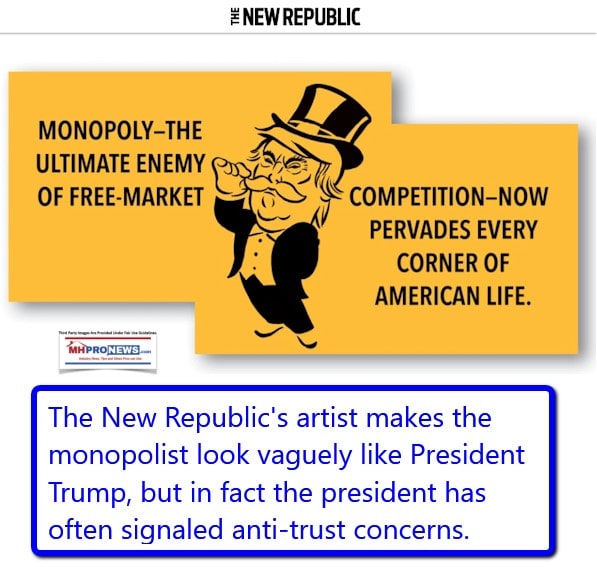
Centralization, Monopolization of America
The parent company to MHProNews is LifeStyle Factory Homes, LLC. We have hundreds of internet properties. People don’t get that; but it’s another topic for another time. We as professionals are pro-free enterprise. We believe that limited government properly operating is a protection for honest people. As political independents, we seek whatever is good in various parties or interest groups thinking while rejecting whatever is problematic.

I first ‘retired’ for several years starting in the late 1980s, after less than a decade in manufactured home retailing. I’ve long done some level of writing, including an award-winning paper that made me the first freshman ever at the University of Oklahoma to win the coveted Lottinville Award in history. That doesn’t mean I don’t get typos, as regular readers know. As Clint Eastwood once said in a movie, a man has to know his limitations.
History and business management classes were great, but when I later stumbled upon selling manufactured homes, that was magic.
This writer earned his keep by selling more HUD Code manufactured homes – and teaching my colleagues and later sales team how to sell more homes – than almost anyone in our market. We – the team – accomplished levels of sales off a single location most in our HUD Code manufactured home (MH) industry today would not think possible.
Affordable housing is always needed.
The growth at that MH retail center I was an owner/partner of was accomplished during an overall manufactured housing market crash in that state. While about 80 percent of the retailers in that state vanished, our sales center was growing virtually the entire time.
The reason this background matters to MHVille will become apparent.
We accomplished that honestly. When there were over ten thousand retailers of manufactured homes in the U.S., we were named by a third-party as ranking #76 in the nation. Rephrased, yours truly was in the top ½ of 1 percent of all HUD Code manufactured home retailers in the country.
Our results during a down market attracted the attention of numbers here in the U.S., but also a Canadian association. One of my first speaking gigs in MHVille was to a trade group north of the border. They were terrific hosts, and seeing their version of manufactured housing was impressive. My theme for that talk in Edmonton, Alberta? Get on your Pontiac and Ride.
Ladies and gents, they have a fabulous mall there, at the time, it had an indoor roller coaster, an artificial lake with sand, and more. Amazing for that time.
Part of the point is this. It frankly doesn’t matter much what the general housing or manufactured home markets are doing. There is almost always a way to honestly sell plenty of manufactured homes. But you must understand the product, your target audience(s), and the current market dynamics.
You have to communicate to others what you know to be true about our product.

That sales success for what began as a modest little retail center – that some thought would never make it – was accomplished from small town Purcell, OK. We – the team – prayed hard, worked hard, and played hard. It would never have worked based on the local population. So, we sold homes into wide parts of Oklahoma, and even a few into neighboring states too. If someone was willing to learn to earn, we could take ‘a housewife’ that had never worked out of the home, and teach that person how to outsell an entire sales center of a competitor.
It takes a little time to teach manufactured home sales, but it can all begin in less than a week. In under a week, you’ll know if someone has the aptitude. In under a week, you’ll see the motivated sell their first home or two. If you think it is about personality, guess again.
As one of the top sellers of manufactured homes in the nation then, powerful financial services firms like Foremost took a keen interest in our work. They brought this then younger fellow up to Grand Rapids, MI. The trip to their headquarters included the best restaurant, with fine, expensive wine. These are matters of record, for those naysayers in MHVille who subtly or boldly attempt to denigrate this writer’s expertise or work product.
The Manufactured Home Merchandiser, and what later became Automated Builder magazines both featured my team’s results.
That said, let me never tire of saying that not one retail customer of our humble sales center in Purcell ever hired an attorney to write a letter, much less sue. We kept our promises, but we also made it clear to buyers that they had duties and responsibilities too. Don’t over promise. Don’t under deliver. Set the right expectations. We didn’t do a ‘sign-here, sign here’ ten-minute document closing. Buyers were given and understood the details, told what to do, how to do it.
The lenders we worked with us told us our loans performed better as a result.
Everyone was respected by our operation and team, before that became politically correct.
Happy customers send referrals. Happy customers make their loan payments to their lenders.
The business was profitably sold, and I retired as a young man. Oh, to be clear, there were a few lawsuits, but only with vendors/businesses who tried to cheat me. Our firm would counter-sue, and won each time. Documenting facts matter. That’s one reason why I get letters from companies now. You learn the hard way that some people will lie, even about success. As time passes, people forget or want to ignore the good things that you did, etc.
Some lessons you don’t learn at the university come from the school of hard knocks.
Boring! Professional and MH Success Tips
Travel, and fun are grand. But after a bit, ‘retirement’ for a doer can become boring. I did a fair amount of writing, and then, some consulting. There was also the telecom business, and that was a money-maker. As in MHVille, I got nice letters about our performance in that field. Money also kept coming in for over a decade from prior years of insurance sales.
This writer has earned awards and positive, peer recognition in several different industries. Selling any product or service is about a few basic principles.
- Understanding your product, service, and what potential value it offers the public.
- Understanding the market, and your target audience(s).
- Understanding the competition.
- Understanding your own operation, what are your strengths, weaknesses, opportunities, and threats (SWOT).
- Getting in front of your prospective buyers as often as necessary to honestly close as many as you possibly can, without high pressure. ‘Marketing’ and sales are both science and art. Especially with housing, because each sale of a home ought to be personalized.
Once you understand the amazing value of a manufactured home, you don’t have to give one away. We taught our team that amazing value. Compared to many firms, our turnover was low.
The competition for manufactured housing might appear to be the other retailer or other communities. But the actual competition is apartments and conventional housing. Never forget that point.
That’s why the upside in manufactured housing is so strong, then and now. Once you learn how to properly and honestly engage with customers, the potential is amazing.
Times change, but human nature remains the same. Ask Warren Buffett.
There were always relatively low-cost ways of marketing manufactured homes (MH), but the internet has made it easier in several ways.
Having done numerous successful projects from Texas or southern states up to northern states, out west, and to the east, what’s truer than ever is that our MH Industry’s opportunities have never been greater.
We’ve done hands-on projects for other MH companies with:
- MH communities,
- MH retailers,
- MH producers, and
- MH financial services firms, among others.
Let me stress, in any business of more than one, all success is team success. So, while this writer brought X to the table, everyone at the table contributed to success. That’s how success in an organization always works.
While not every MHVille project was a success, the vast majority were. For example, people can be taught how to succeed, but then may fall back into an old, bad habit. There is evidence like letters-of-recommendation or third-party reports to prove these points. Why is this relevant now? That’s all said so that the naysayers in MHVille who have been attempting to backstab are shown for being who and what they are.
Those less than successful MH Projects produced lessons learned. They can be reduced to these 3 gems. People unwilling to change, internal power struggles that were avoidable, but still happened, and starting off well, and not sticking with the plan. People often fall back into bad or old habits.
Let me note that about three years of RVs, and 3 wildly successful RV projects, were part of my roaring 90s. Statistical Surveys documented two of those, the third was a project for a campground location that – last I heard – Sam Zell’s Equity LifesStyle Properties (ELS) now owns.
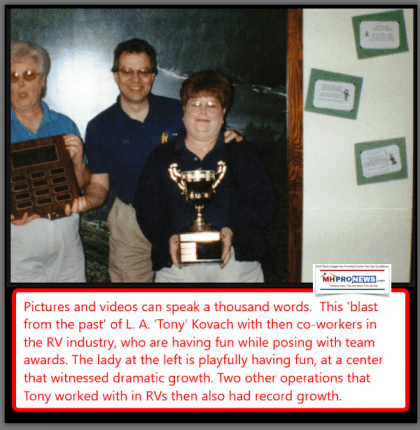
There was also time in the 90s and 2000s invested in trade show marketing, and beyond telecommunications, automotive services. Success, success. See the 5 numbered bullets above. Each of those projects yielded tremendous insights, useful for manufactured housing marketing and sales. It is all about those 5 bullets, plus prayer. It’s about getting in front of your target audience with the right attitude of service-via-authentic-engagement that’s tailored to each prospective buyer.
Enough about me. That’s said to reflect the reality that when it comes to manufactured housing, we know what we are talking about here. It’s why our content is relevant. Keep in mind, MHI says there are 40,000 full time pros in our business. They’re wrong, but let’s use that number as a reference point. This article is long, but by the end of the month, it may have 5,000 or more individual views. A good, shorter one can hit 15,000 to 20,000 in 30 to 45 days. In a small industry today, nothing in MHVille comes close to our engagement with the target audience.
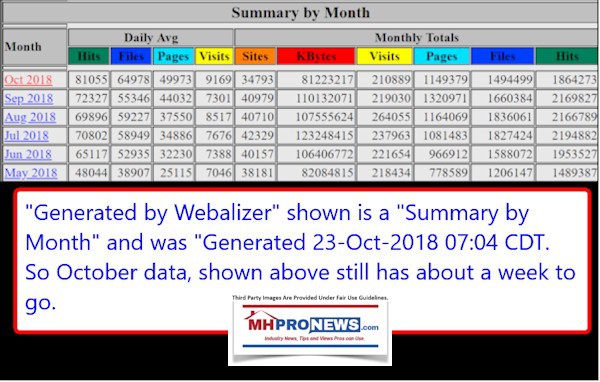
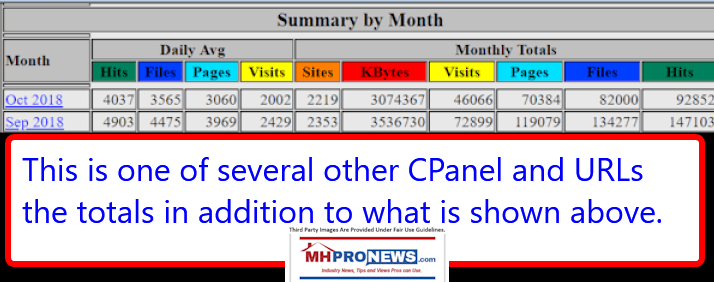
As MH community owner John Caron said in a video further below, what we do here on MHProNews can be summed up in the word, “relevant.”

George F. (F?) Allen or Darren Krolewski have been among those who praised my work in public and in writing. So why are those same voices now they trying to undermine what we do now? Isn’t that a fair question?
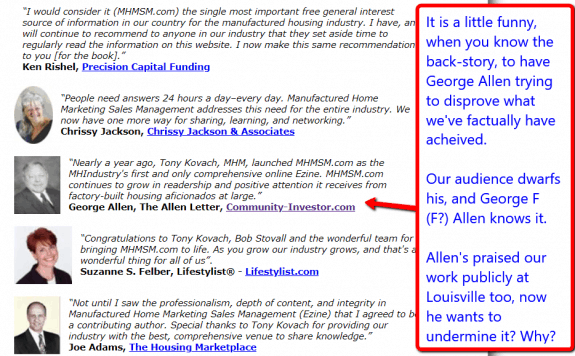
Darren and his father witnessed first-hand a project that Liberty Homes commissioned them to study, review, and report back to them about, so that they could understand what we were doing. In that project, we achieved a surge in new home sales, and filled numerous sites – in part by raising prices on homes going in a previously struggling land-lease community. That same community’s sales had previously been groping for traction for at least 3 years. We didn’t rent homes, we SOLD homes. We have the reports that Darren and his dad wrote, and they sing this writer’s praises.
FYI, I have never tried to eliminate a competitor, we are not the monopolists. Competition is good, while monopoly in many cases emerges as a form of economic slavery.
So, let George F. (F?) Allen and Darren Krolewski play and say their seemingly hypocritical purported ploys, but they must stand on their own smelly hypocritical behavior. George stood in front of a room full of industry professionals in Louisville, and said pointing to me and a colleague that, ‘These guys [MHProNews] are the future of manufactured housing.’ In a moment of humility, Allen referred to himself as the past and [the then] present.
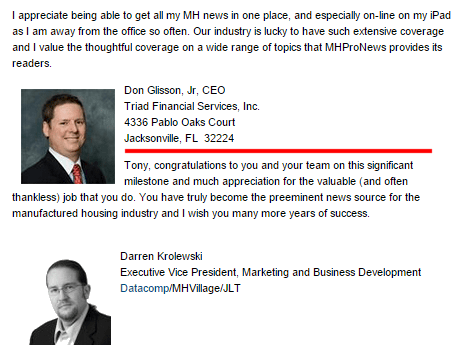
Let me now say one of my weaknesses. I tend to be trusting, until someone proves not to be trust worthy. I’m working on that one, and hereby credit interesting folks like George and Darren for the lessons learned — painful ones that are arguably making me stronger in that regard.
Can we stop Kevin Clayton and the Berkshire brand’s cronies, tools, and surrogates from paying whomever to say whatever? Clearly, no.
But it was a Clayton owned retail store in the Houston metro not so many years ago that I was given to save from closure, and did. Then, from my vantagepoint, the Clayton politics and games began. I wanted no part of that, so this writer shook hands with the fellow I reported to, and we parted ways. My guess is that Clayton didn’t learn the lessons of my work at that store, because that location I turned around for them — later closed anyway. It is now operated by an independent. Last I checked, that independent was doing fine.
Some people who think they know it all – like Clayton? – can’t seem to explain why they have had to close over 100 retail centers, during an affordable housing crisis.
Some giants who are busy building moats instead of learning how to play nicely with others can’t explain why their Clayton iHouse, or other projects of theirs, were abject failures.
Doesn’t Clayton understand their own industry well enough to make an iHouse successful? They had an interesting concept. They just didn’t know how to market and sell it. They didn’t lack for publicity. They just proved to the world that Clayton didn’t know how to market it and sell the iHouse.
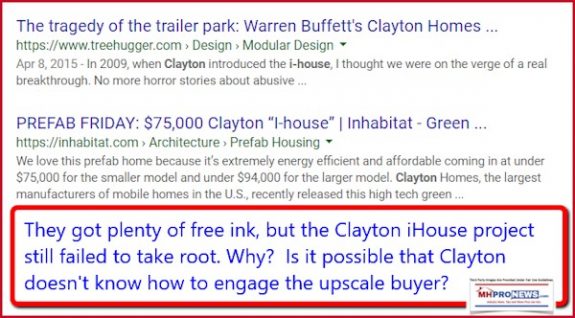
Let me hereby warn all of those involved in the ‘new class of homes’ project of MHI-Clayton. It is fatally flawed. That is not just my opinion, but the view of those inside companies that have committed to this debatably flawed concept.
“What Are We, Chopped Liver?” MHI Member December 2018 Reactions
- First, it misdirects the Duty-to-Serve (DTS) dollars from the Government Sponsored Enterprises (GSE) away from all manufactured homes, including those that are most affordable, other than those select few models. That means it fails millions of existing HUD Code manufactured home owners that might want to refinancing, but it also fails the producers of the vast majority of manufactured homes that are being sold in the U.S. The plan is arguably designed in part to protect Berkshire’s lenders, and Tim Williams has said as much in the last MHI meeting I attended. Dozens heard what I did.
- Next, where is the track record that Clayton can point to that shows that they can sell these kinds of upscale HUD Code homes? Clayton failed with the iHouse, which could have worked. Why does anyone in MHVille think that just because they are the biggest, that means that they are correct about this new class of homes?
Clayton and Berkshire professionals are among those MHI member firms who provide news tips to us. Why? Because some of those good people inside problematically led operations ‘get it’ that their leadership’s core is purportedly built on a monopolistic premise. Want evidence?

Dare to See what Kevin, Tim Williams, and Warren Buffett each says himself. We quote them, in their own words, or show them speaking in their own words in videos and documents found at the link below.
Bridging Gap$, Affordable Housing Solution Yields Higher Pay, More Wealth, But Corrupt, Rigged Billionaire’s Moat is Barrier – manufacturedhomelivingnews.com
America woke up today to division. But perhaps 75 percent (+/-) of the nation’s people could come together on a plan that demonstrably could do the following. Increase the U.S. Gross Domestic Product (GDP) by some $2 Trillion Annually, without new federal spending.
I’m sorry to admit that this writer has gotten used to the game playing and corruption that has crippled this once far larger and greater industry. Manufactured housing has gone through highs and lows. The need for manufactured housing has never been more obvious to those who understand the product.
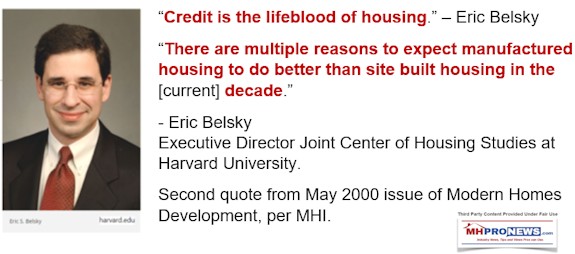
So why is manufactured housing hovering near historic lows? There are many factors.
But don’t expect MHI, Clayton, or Buffett to explain those causes to you. Because arguably, they are at the heart of the problem.
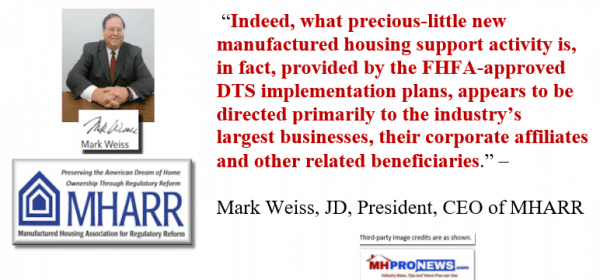
Go to the linked text/image box above that cites Warren Buffett, Kevin Clayton, and Tim Williams/21st. Only then will you begin to get the picture.
A big problem that the Omaha-Knoxville-Arlington Axis has is that they’ve praised us and our pro-industry work publicly too many times. Is that why thy use pawns like George F. (F?) Allen? Pardon me, if I yawn. Because Tim Williams and other MHI powers that be praised us, now they want to silence us? Excuse me?
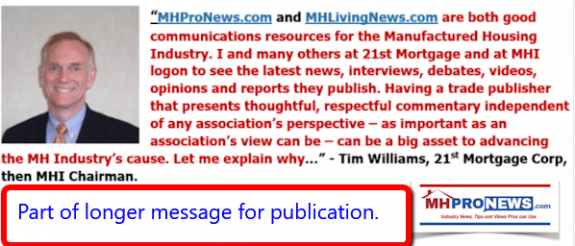
Or this from Sam Zell’s right hand man, may God rest his soul.
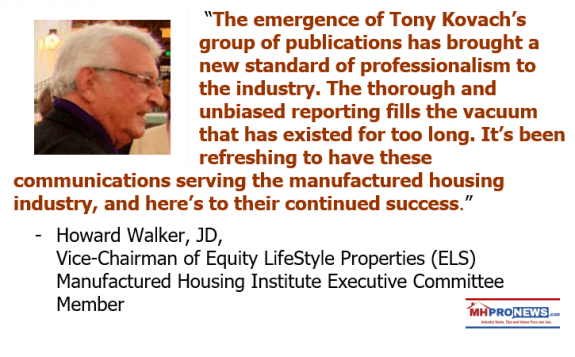
But there is more evidence of respect from such leaders, and others too. See the video below.
Understanding People, Understanding Market Barriers, Understanding History
Education, said James McGee and Chet Murphree are at the heart of whatever is needed in our industry. That’s true.
That education must be internal to our industry and external to the general public. You can see their comments near the end of the video posted below.
The data and the quotes both point to this fact. The most successful communications tool to the largest audience of industry professionals is the one you are now reading. MHProNews is tailored primarily to industry professionals who want to – or need to – grow. There are secondary audiences on MHProNews, such as investors, affordable housing advocates, public officials, and policy wonks that find manufactured homes to be interesting. But the primary audience are professionals in our industry.
The Manufactured Housing Institute (MHI), based in Arlington, VA claims many things. Some are true, others are inaccurate, some are a mix of disputable claims. MHI has an educational arm, MHEI. Let me say, there is some value to that concept. But it is being underutilized. Furthermore, they can’t teach what they don’t know. Some of their ‘education’ misses the mark.
Want evidence? The proof is in the new HUD Code shipments numbers.
Manufactured Home Production Decline Accelerates in November 2018
There is an ‘info war’ on in manufactured housing, and in the nation as a whole.
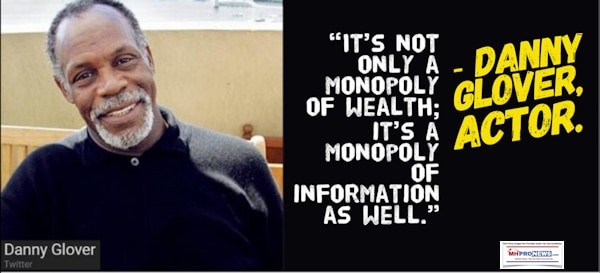
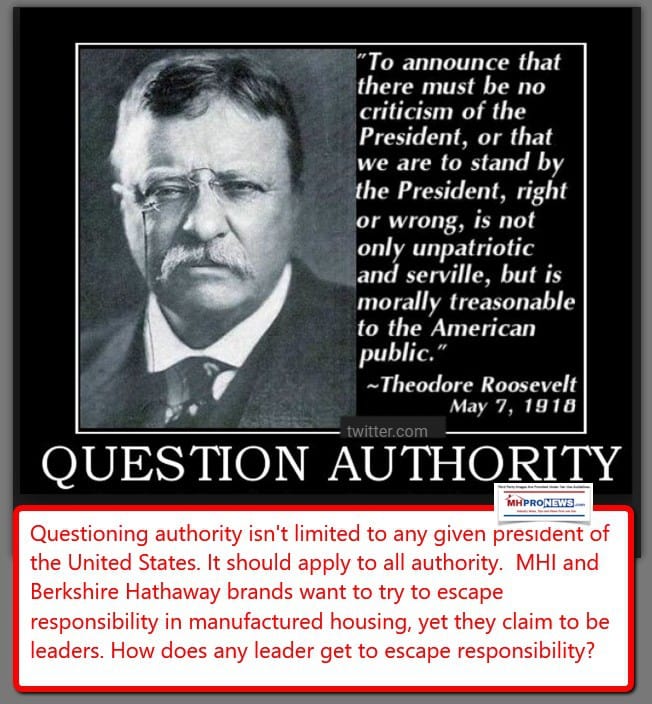
For the monopolists and their pawns – like self-contradictory George F. (F?) Allen? – there are a few simple realities they can’t disprove.
1) If firms like Clayton truly knew what they are doing in manufactured housing, why have so many locations had to be closed during an affordable housing crisis?
2) If they know what they are doing, why are shipments so low?
There are several possible, logical explanations.
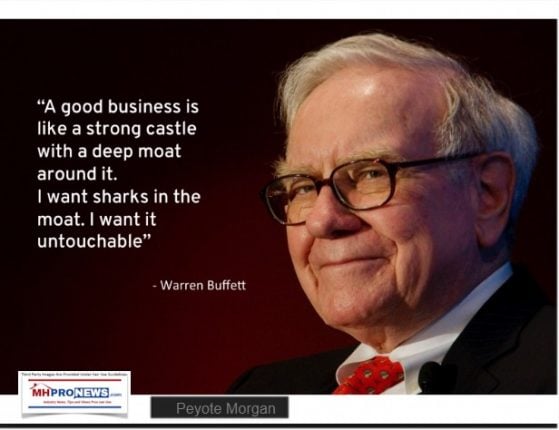
Arlington based MHI is regrettably part of the problem in our industry. The list of those who think so is significant. Keep in mind, this writer for years was an MHI member, and was elected to an MHI board. I tried for years to effect change internally. My reward was finally to be ejected from membership on the written pretext of an unsigned letter that our operation published news, and they had ‘no membership category for news.’ Can you believe that? It’s true. It didn’t matter that our primary sources of revenue – and a stated part of our membership from the outset – was Business Development Services and consulting.
The truth is often different than what people say. Once more, Marty Lavin is right. Pay more attention to what people do, than to what they say.
And follow the money.
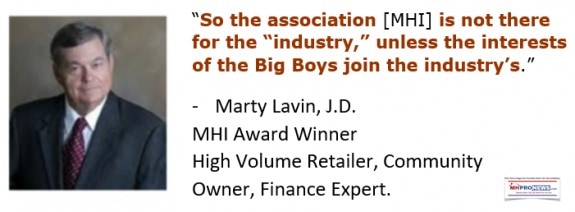
Manufactured housing has several moving parts. But the core of the business is simple.
Affordable housing. The rest are details and commentary.
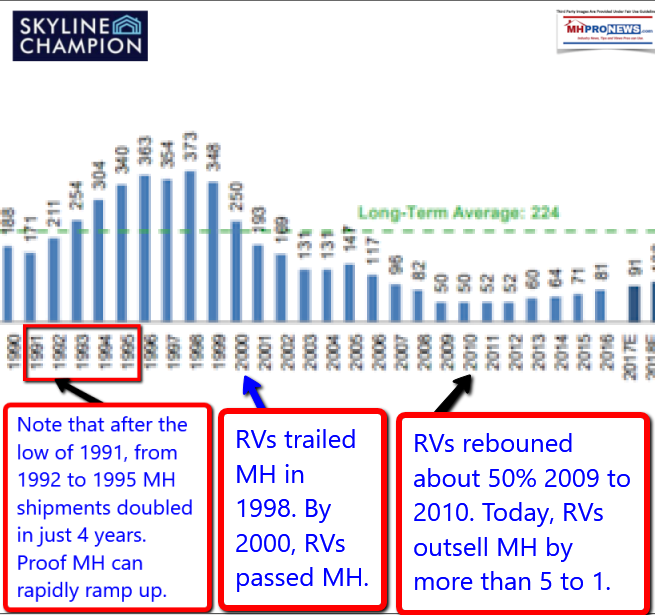
That affordable housing is one of the largest potential businesses in America. It was noted at the top, it is worth hundreds of billions of dollars a year. While manufactured homes have reached some impressive levels of success in the past, it has arguably never achieved its potential. Why are they willing to try to suppress MHProNews? Could it be that the monopolists want those hundreds of billions for themselves?
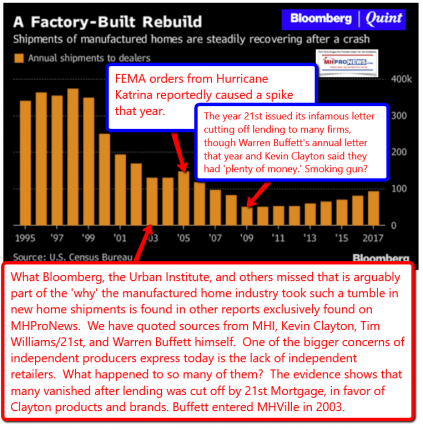
The Disney “Trailer” Controversy
Disney would not confirm yesterday that the Manufactured Housing Institute (MHI) had weighed in with them on the controversy over the errant – and in that context, derogatory – term ‘trailer.’ Why not? If MHI cared – as they claim to do – about our industry’s image, why don’t they see to this matter?
Food, Folks, Fantasy, Fun, and Flubs – Disney’s “Trailer” Slur Update
Perhaps it has been too long since Kevin has walked a sales lot and tried to sell a HUD Code manufactured home. I wonder if – or how many -manufactured homes Darren has personally sold? Or has George F. (F?) Allen sold anywhere near the number new manufactured homes – and for the price-points – that we and some of our clients have achieved.
Who is the Industry Listening to, and Why?
Until the industry sheds that ‘trailer’ image, we will be hobbled. It is one of the points that Frank Rolfe and I have tussled over. I get why he did what he’s done, and we know that they have significant achievements. But there’s a cost to that T-word, and the image that goes with it. Frank is slowly coming around on terminology too, but we’ll see what time brings.
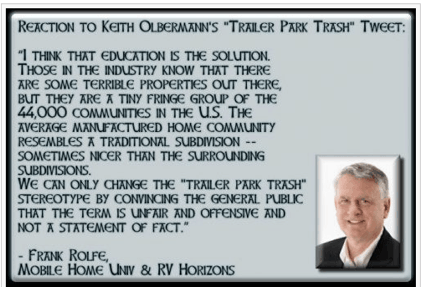
That said, Susan Bretton with the National Manufactured Housing Community Owners (NMHCO) association sent me the following comments on the Disney controversy.
“Tony:
Here’s NAMHCO’s statement regarding the Disneyland issue, from President Neal Haney.
“It is important to get the nomenclature right – whether it be modular offices or manufactured homes. Trailers are for cargo, modular and manufactured structures are built to modern codes and provide homes and workplaces for millions of Americans.”
We’ll be passing that onto Disney next week. Ask yourself. Why hasn’t MHI, Clayton, Cavco, etc. weighed in on this controversy? MHARR, Al Kemp led Canadian Association has, ROC USA has. Why not MHI? Do you see the obvious disconnects?
Summing Up
The Monopolization of our MH Industry is a subset of a broader problem in America. We’ve made that point clearly in numerous reports.
Monopolistic practices create several problems. Among them:
- A corruption of the political process. Just look at gridlock in DC, over an issue that leaders of both sides of the political aisle have agreed upon before.
- A corruption of businesses and markets. Free enterprise and monopolistic capitalism are two different things. Smaller businesses routinely better serve their customers. That doesn’t mean that big businesses can’t serve well, but when they get to the point of market dominance, it’s a problem for all. That includes, surprisingly, the harm done to the monopolists, another story, another time.
- Some believe that Buffett, the Berkshire brand companies have artificially kept manufactured housing small, to allow them to consolidate the maximum amount of the market place.
- Monopolies also harm wages. Look at Amazon, and the controversies in the news about their pay. Do workers at Clayton believe that if they ever succeed, that they will get a pay raise for it?
- In fairness to MHVillage, they have a somewhat useful service. But they clearly don’t know how to convert their visitors into more customers, Darren said as much last year in Tunica. Their own data says as much, even if Darren didn’t say so. We will always try to be objective, that is one of many values that we bring to our industry’s readers and clients. Objectivity and fact checks. But that objectivity cuts both ways. There is no point in the powers that be denying the fact that manufactured housing is underperforming. The only questions are why? And what can be done about it? Clayton, MHVillage, and industry statistics all point to problems – disconnects – between the tens of millions who could be a manufactured home owner, but are not.
- Stereotypes must be changed, and that has to occur through fact-based education. It is not about high-pressure sales tactics. It is also not about over-promising and under-delivering on homes. I’ve never tried to sell a new Chevy, but if I did, I wouldn’t do it by saying it was a Rolls Royce.
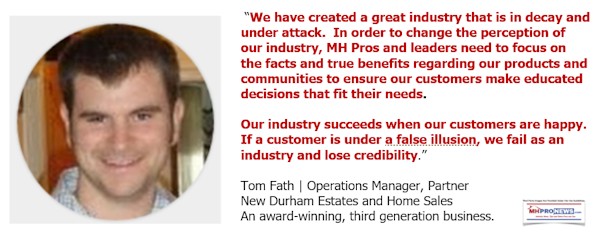
- MHI is IMHO, hopelessly corrupted. They can’t even purportedly backstab in a consistent and intelligent way. There may be a one, two, or three people at MHI that are worth their salt, but the majority at MHI are spokes in the monopolists’ wheelhouse.
- Clayton, and Berkshire Hathaway ought to be broken up under antitrust laws, as should the FAANGs. The SEC and others in Washington D.C. are already investigating many of the issues noted above and from articles linked herein. So while we will say, alleged, and mean it, one must also consider that there is a reason why these monopolists want you not to be reading here on MHProNews.
- It is only because we are over the target that we are catching flak. When Allen or anyone else claims to be working for the interests of the little guy, all you have to ask is this. If that is so, why is he carrying MHI’s water?
- We are not perfect, never claimed to be. Because we publish more than anyone else, and it is relevant, and we research before we write, we get the most readers by far, period. If you want something done, ask a busy person to do it. Because our firm does more – much more – than just write!
If we were kooks and odd balls, you wouldn’t have read this far. Pardon me, George F (F?) Allen and your hidden allies, but we’ve never spun a conspiracy theory.
We’ve laid out facts, money trails, evidence, and reason. As recently as yesterday, this writer personally invited Kevin Clayton, Joe Stegmayer, Tim Williams/21st, Nathan Smith, Richard ‘the Dick’ Jennison, Lesli Gooch, Rick Robinson to refute a single one of the fact-evidence based reports we’ve published. There reply?
Crickets.
Because we do follow the money, the evidence, the history/track record, and the facts. That’s why investors and pros call, write, and engage here. We lay out evidence based upon reality, not some MHI razzle dazzle smoke screen that requires readers to suspend their common sense. If they truly wanted to grow the industry, and if they truly wanted to grow, then why are new home shipments doing so poorly?
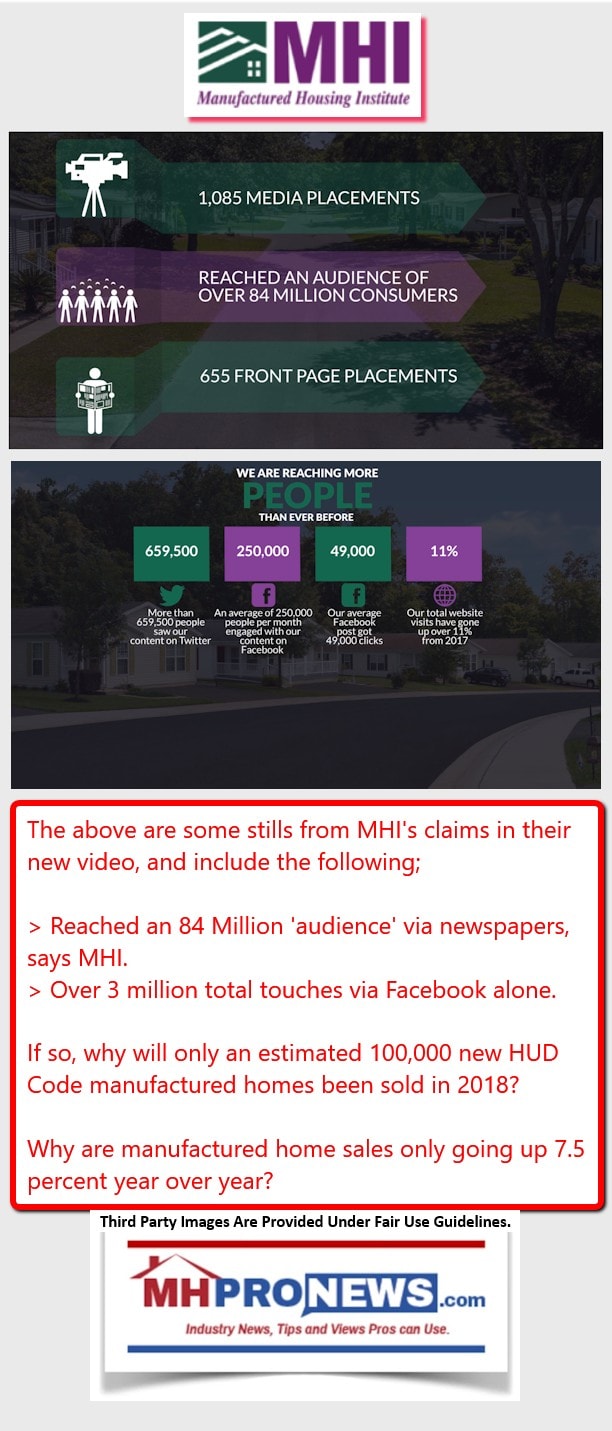
The Omaha-Knoxville-Arlington (OKA) Axis may be good at creating a growing monopoly, as the article linked above lays out in their own words.
There is an affordable housing crisis. Manufactured homes have been highly praised by third-party research for over 20 years. Last year alone, there were several largely positive research reports, like the one from NAR cited above. Nevertheless, the industry at the end of 2017 was at about 24 percent of their previous high. That prior high was also still not the industry’s true potential.
We are left with a few inescapable conclusions, based upon the evidence and common sense.
- OKA-Axis (A-OK Axis sounds better, but they aren’t a-ok) either don’t want to grow the MH industry, but they claim that they do.
- The OKA Axis want the industry to stay small, so they can increase their monopolization. When they are ready to take the foot off the break peddle, they will.
- The OKA Axis have weaponized as much of the MH industry’s trade media as they can. MHProNews is the one spot they can’t control. To be fair, MHARR’s reports must be considered, as MHARR has routinely been correct on issues that MHI is wrong about. But MHARR’s stated focus is advocacy in DC for the independent producers of HUD Code manufactured homes, not trade publishing.
- MHARR, and the new NAMHCO are evidence that MHI isn’t doing the job. Both are breakaways from MHI.
- Even self-contradictory George F. (F?) Allen has admitted in the past, and recently that MHI isn’t doing their job. He has a few interesting things to say, but he is arguably duplicitous, self- serving, and not to be trusted. It was a former Allen client who told me that the way to understand George is simple. ‘Tony, it is AAA, All about Allen.’ The rest are details and commentary.
- There are some fine state execs, and some not so fine. Most are under the Berkshire thumb, in some form or fashion. But among those, there are some who provide us with intelligence as to what is going on.
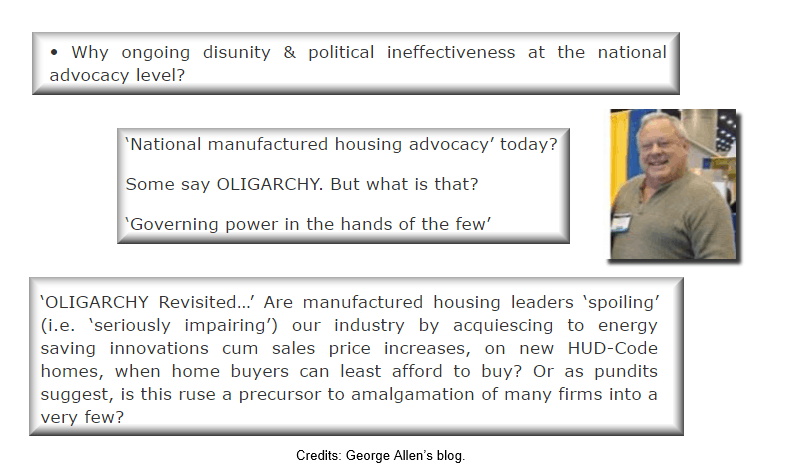

MHI’s purported attorney asked us to ‘cease and desist,’ yeah, right. But what none of the personalities noted above have tried to do is show me or the industry how any of our research on MHProNews is incorrect. Yes, we get typos, because we are busy doing other things. But facts, those are #NettlesomeThings.
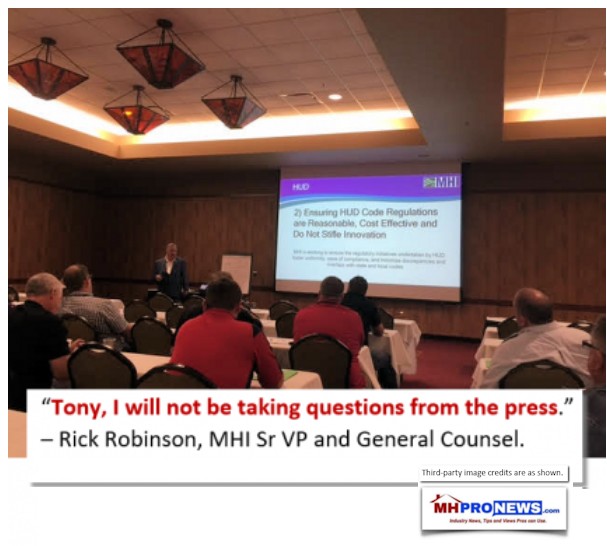
If OKA-Axis and their surrogates could disprove any of what we’ve published, they wouldn’t be trying to silence us with letters filled with what they want to project as dirt about me from 20 to 25 years ago. I’ve said before, and will again. Anything they want to point to, let them do so in public, and let them appear in public. I can explain in two minutes family feuds of the past, that were long ago settled favorably, or why this firm or another had to be sued, and why we routinely won. I’ve got nothing professionally to hide, so how about them? It is they who are the muckrakers, not myself. We’re laser focused on facts, evidence, and what are logical questions.

We are the only independent trade media in MHVille to report what is actually occurring, not the spin coming out of Arlington. The feds are investigating Clayton et al, not us. Perhaps the powers that be in MHVille afraid that their purported monopolistic con game is up?
Maybe they should be? We here at MHProNews must be over the target. That’s why they are pulling out all the stops.
Their target is hundreds of billions of dollars a year in potential business in manufactured housing.
We believe that millions of Americans can be honorable served by manufactured homes done right. The rest are details and commentary. But we know how to beat them at their own game, and it is all about honestly using existing laws and the truth well told. “We Provide, You Decide.” © ## (News, commentary, and analysis.)
(See Related Reports, further below. Text/image boxes often are hot-linked to other reports that can be access by clicking on them. Third-party images and content are provided under fair use guidelines.)
By L.A. “Tony” Kovach – for MHProNews.com.
Tony is the multiple award-winning managing member of LifeStyle Factory Homes, LLC, the parent company to MHProNews, and MHLivingNews.com.
Office 863-213-4090 |Connect on LinkedIn:
http://www.linkedin.com/in/latonykovach
Click here to sign up in 5 seconds for the manufactured home industry’s leading – and still growing – emailed headline news updates
Related References:
The text/image boxes below are linked to other reports, which an be accessed by clicking on them.
Bridging Gap$, Affordable Housing Solution Yields Higher Pay, More Wealth, But Corrupt, Rigged Billionaire’s Moat is Barrier – manufacturedhomelivingnews.com
America woke up today to division. But perhaps 75 percent (+/-) of the nation’s people could come together on a plan that demonstrably could do the following. Increase the U.S. Gross Domestic Product (GDP) by some $2 Trillion Annually, without new federal spending.

